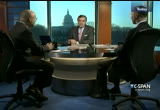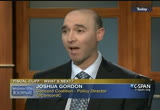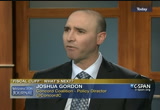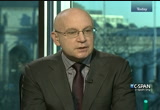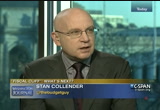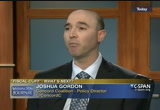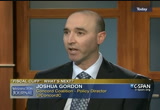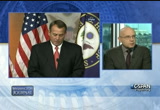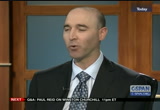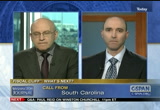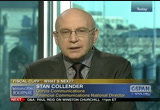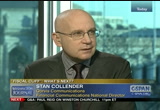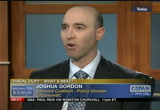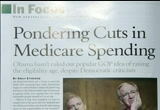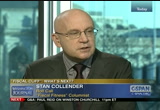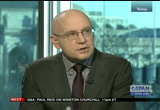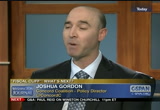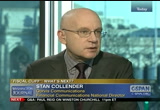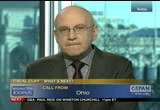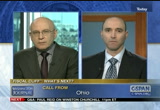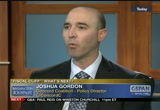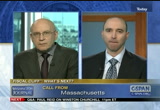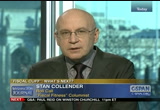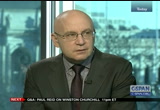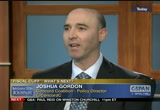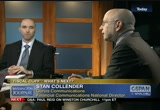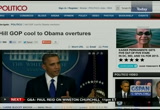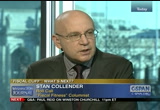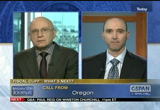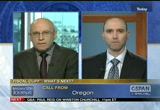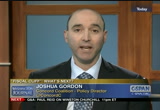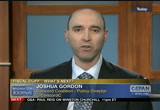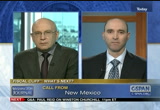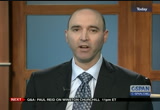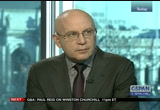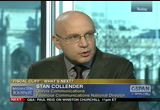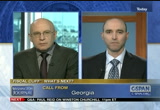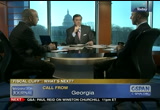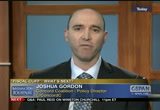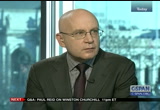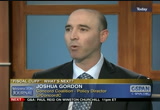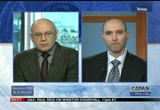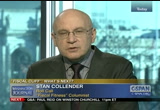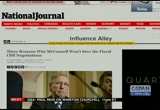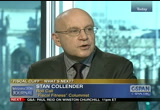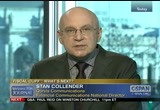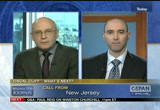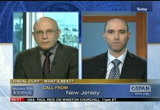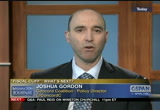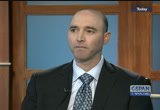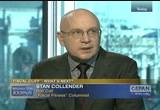tv News Politics and Public Affairs CSPAN December 23, 2012 10:05pm-11:00pm EST
10:05 pm
about a 70% chance that we're going over the cliff, what are the odds today? guest: i would about 90% the new mentality in washington is that we don't to do it december 31. they have a couple of weeks in january before this starts to pinch a bit. it is not as much of a cliff that people were saying a few days ago? host: are we going over the cliff? guest: i think we're likely to do it. you don't have major economic effects on your afternoon's person income pay, paycheck. it is going to take a couple of weeks before that to start happening. you do have a brief week or two window where if they got something done it would be a political switch but not a major
10:06 pm
economic one. host: you're a veteran of the hill. when was the last time that congress was here between christmas and new year's? guest: i don't remember but it happens a lot on budget-related matters. when i worked on the hill there were lame-duck sessions but they did not go up this late. this is kind of chaos it is close to unprecedented. i've never seen a speaker be pushed back on by his own party as hard as what happened to john boehner this week. host: let me read to you "activists that helped john boehner's plan b saying that republicans must be ready to go over the fiscal cliff that includes no tax increases. sbainer boehner and other republican leaders have been too scared about suffering publicly if the nation goes over the
10:07 pm
cliff and the tax sbikeses that are triggered in january. now that the plan b has failed these conservative republicans should be empower you ared to make big demands and stop caving to the president out of fear." guest: that doesn't make much sense to me. you have to get it through the house republicans then the president has to sign something, if that doesn't happen then you have very large tax increases a lot more than what they were talking about in their negotiating and you have the defense cuts that happen overtime and some other, nondefense cuts. you really have this huge amount of revenue, a lot of debt reduction. it is hard to see what demands the republicans can think will be easier to make come the new
10:08 pm
year. guest: plus, we've seen the president's approval level is at a high. and the poll should show that the republicans are going to be blamed if we go over the cliff and taxes go up. that is before the debacle with john boehner. it has been a bad week and it sounds like they are continuing to be a little delusional. host: it has been a tough week for the speaker. when you make a threat you better beable to back it up. guest: i think the only people that had a worse week was the wizards. this was a bad week for him and you can't shugger coat it at all. host: the guide to the federal budget, how big is the federal budget? how much money does the
10:09 pm
government take in? how much do we spend? how much is $167 trillion for the current debt? guest: spending this year will be $33.8 trillion. the deficit of about $1 trillion that is for fiscal 2013. that assumes that somehow the fiscal cliff doesn't happen and we don't reduce the deficit by $600 billion. national debt, about $16 billion , debt held by the public -- as a percentage it is getting up there. we've had it before. as we talked about two weeks ago it is not so much that the size of the debt it is how fast the debt is growing in comparison to the size of the economy. you don't want to pay off the debt but you want it to fall.
10:10 pm
host: how did we get to this point? why is the government spending so much and under this president, we've seen the debt go up $1 trillion each year over the last four years. where is it going? guest: there are two main ways to look at it. right now, we're still coming out of this economic crisis. so you have large debts for four years mainly because you have low revenues as people don't have jobs or they are getting paid less. then there has been extra spending programs over the last four years but also, we have this mandatory spending programs that grow on auto pilot. over the last four years they have grown because they represent the basic social safety net that we have when we enter recessions. so food stamps, medicaid, they spend more when the economy is
10:11 pm
bad. so i think that is the main thing to look at when you look at the last four years. there are some structural issues that we don't blame but look towards to explain why people are afraid of debts over the long-term. that is because our mandatory spending programs will be growing as the number of people eligible for them, mainly those who are in retirement or old age, that is going to swell as the generation retires. on top of that, you have health care costs that grow quicker than the economy. they have been doing so in the last 40 years and continue to do so. when you combine the two things you look at a spending base that can be increasing greater than normal. to pay for that we have a tax code that has loophole deductions and really does not do a great job of raising revenue. certainly the rates of this tax
10:12 pm
code have been cut over and over again over the last 10 years and that is decreased the amount of revenue the government is expecting to take in. >> if you're listening to us on c-span radio we have stan collender who writes a article on roll call and joshua gordon. what happens next as we reach the january 1 deadline? let me share with you -- jonathan strong of roll call talks about anger in the republican caucus. he says, first of all, -- there is anger directed at conservative law make es. that fractures reaction means
10:13 pm
boehner is unlick to face significant challenge to his decision as speaker in the near term. the question is who is at the table? does he negotiate from a position of strength when it comes to this next round with the president and senator mcconnell? he is at the table, senator reid, and others. guest: i am not sure that john boehner will be at the table. he said it is now up to the senate, i am going home. it is not taking my ball and going home, but it is doing as much as you can. he is literally looking to his republican colleagues in the senate to work with harry reid to get something acceptable. if he does, that will put significant pressure on house republicans that did not otherwise exist. i want to push back a little bit. since may, i thought that john boehner -- he made a speech back in december where he talked
10:14 pm
about $1 for spending cuts for every $1 increase in borrowing. red meat for the tea party wing. it was clearly an attempt to say, i am your guy. it is not clear to me at the moment that, one, anybody would want the job, and two, that there really will not be a challenge. it has to come together very quickly. they do not need somebody to beat boehner. all they have to do is withhold 18 republican votes in the house. he would get an absolute majority and would not be elected speaker in the first round. >> robert williams says that we need to cut spending. sequestration was a democratic deal. deal with it. guest: i would call that a deal between the republican congress and president. the whole point of sequestration, if we remember,
10:15 pm
was not to have to take effect. the point was to have such a bad outcome that the super committee that was created in the august 2011 debt ceiling deal be so afraid of the sequestration that they would reach a bipartisan compromise that would reduce deficits by the same amount that sequestration was expected to, but in a much more balanced and sensible way. democrats and republicans were unable to reach an agreement and that is why you have this sequestration. sequestration was never intended to be policy. it was intended to be so bad and foolish than democrats and republicans would be forced to agree to something. obviously, that calculation perhaps mistook the level of disagreement there was between republicans and democrats on this issue.
10:16 pm
host: stan collender and joshua gordon. democrats line, good morning. caller: good morning and merry christmas. i do not believe this congress is going to be able to deal with the fiscal cliff. the next congress, unless they reform senate filibuster rules and also -- and you can tell me whether this is a dream come true -- what if nancy pelosi and john boehner kind of got together and nancy pelosi told boehner he could bring the votes for his speakership and then maybe together could isolate the tea party section of his group and take away some of the
10:17 pm
radical left of her group and bring the moderates together, support him for speakership. me, being a democrat, i would not get everything i want, but the republicans would get everything they wanted. by the time re-election came up they would have seen there was a lot of progress made and maybe they could not run primaries on those guys that decided to run to the middle with policy they laid out together. host: thank you for the call. guest: so many things. basically, you are assuming that john boehner would be elected speaker in a democratic house. it is not likely that they would give him their votes. it is far more likely, quite honestly, that the democrats would like to see continued
10:18 pm
disruption on the republican side. either way there would be a much-weakened speaker or he would be deposed. host: this president haas tried to give him some cover and boehner's party made him look foolish. agree or disagree? guest: i agree completely. this is something that has to take place, a conversation with the republican party. i started to say this before the election day. the first step in the fiscal cliff ought to be a republican discussion about what they were and were not willing to do. that did that seem to take place until earlier this week. the conversation was inconclusive. the one thing that has not happened yet, democrats have provided the votes on a lot of budget-related matters over the
10:19 pm
years but it was only after the tea party gave boehner permission to negotiate with the democrats -- those circumstances have to happen. we see you pushed as hard as you could. we now need to get something done. we're going to vote against this but work with the democrats. host: we have spoken to a number of republicans who say that the problem is spending. the government needs to cut spending. that is where we need to go in terms of reducing the deficit. guest: that is true, we need to cut spending, but there is some conflicting other couple issues. we to cut long-term spending on retirement programs to make them more in line with economic growth, not make them grow that much more quickly than economic growth. all the things that the republican house has passed, cuts, have the discretionary spending and non-defense discretionary spending.
10:20 pm
so i think it is true you have to be serious about long-term mandatory spending reductions, but you cannot get there only by reducing spending. you have to do something on taxes. really, plan b was about tax cuts, not spending. it seems to me the only with the republican party will get major spending cuts passed is it they also agreed to new revenue. otherwise, the president cannot be out there continually only cutting spending while leaving all of the bush-ever tax cuts in place. host: let me share with you what emily etherege writes. she says it is almost certain that social security will be part of the deal. continued murkiness has groups concerned. democrats are critical of the president putting this issue on
10:21 pm
the table. republicans say it has to be. guest: despite the conversations about the grand bargain, it was never going to happen, there had not been enough preparation. one of my predictions from my column in 2012 was predictions for next year. what i am telling everybody is we are not going to get a big tax reform package next year because it takes two years to enact. without that, we will not get mandatory spending changes. that means the grand bargain is two years off. it cannot be part of the fiscal cliff at all. if there is one, it will be a figleaf. something small to get people political coverage to cut the tax increases to be canceled. host: why is it so much harder today than it was in 1986, when
10:22 pm
her of writing was able to forge a compromise on tax reform? guest: where do you want to start? communications are very different now. the internet, cable tv, informing people differently. you have a different situation with the leadership. the 1986 tax act took three years to enact. congress was a lot less partisan, the country was less divided. also, that was different in the sense that it was opposed to be revenue neutral. at the end of the day, whenever they changed, it would bring in the same amount. now there is a general consensus that tax reform will have to bring in more revenue. that makes it a far more difficult process. in addition, the country has gotten older. more people are on medicare and
10:23 pm
social security and medicaid. that is where the voting power is, and that makes things but more difficult. guest: when you are looking at this specific deal in you want to know why they cannot get together, one of the things people forget, they have already done a fair amount of short-term spending cuts. the budget control act, which cut almost $900 billion from discretionary spending, you have the sequester which sets the baseline norm for discretionary spending. not having that $2 trillion of additional spending cuts on the table for this deal makes it harder to do. there is only so much cutting you can do in a short 10-year time period, especially as the economy is recovering. if you look at health care legislation, tinkered with medicare to the degree that, while it did not fully reform medicare or set it on a
10:24 pm
sustainable path, there were cuts to medicare in that legislation that is making it harder to include 10-year savings for this current deal. it is almost impossible to find the size of savings in medicare over the next 10 years that could appease the republicans, i think, on this. that is something that is not greatly appreciated. host: that is what johnston says on twitter. guest: mathematically, it is one of two things or both. you could also say we are taking in less than we are spending. the question is, commitments like medicare and social security, are these things we want to continue to do, and if so, are we willing to pay for them? maybe we did not know what these things would cost. maybe we did not know additional benefits would be provided. maybe we did not the there would
10:25 pm
be loath to small businesses and students. the question is, are these priorities we want to pay for? if not, are we willing to cut them? that is the essence of what is going on. it is not just a mathematical thing. you can say it is the revenue or spending or a combination of the two. josh is right. there has to be a combination of both. host: next phone call. caller: i had a couple of things i wanted to bring up. what was the tax code that the gentleman brought up? long ago i was talking to my senator and representative about this tax code reform. nothing ever seems to be done. it just seems to get worse. you almost have to have a cpa now to do your taxes.
10:26 pm
i will make a suggestion on this. do away with the payroll tax holiday. basically, all that does is for social security. people working really do not need it, and the employer does not need it. and the bush tax cuts, they talk about this hurting the rich and famous, but basically, people have 401k's, ira's. after the depression, things did not get back in line until 10, 15 years later. host: another point on this, we cannot get tax reform with the current congress. they do not have the capacity.
10:27 pm
guest: i am not ready to write it off completely. host: you are more optimistic than stan collender. guest: we had a disagreement on this last week. there is an underlying consensus on the hill that we need to do tax reform, mainly because you have these tax expenditures which have grown in size. we lose as much in revenue to tax expenditures that we taken through the individual income tax, and there is consensus that you need to start broadening the base and getting rid of some of these deductions and credits and expenditures, and that allows you to not raise rates higher than they would have to go, if that is the only way you focused on revenue. it really is a win-win, where republicans can say they have lowered the amount of government interference in the economy by getting rid of these tax
10:28 pm
expenditures, and democrats can say they are bringing in more revenue, which will allow them not to cut social security as much as they would like to. host: kevin on the republican line. good morning. caller: my question is, when does our currency become almost worthless? when we get to 80% of our gdp spending? what is the purpose of gold? i know what the purpose of gold in fort knox was. reprinted our money but backed up with gold. what is the purpose of the gold in fort knox, what is it being used for, and what is the value of the gold in fort knox right now? guest: i do not know about you. it changes based on commodity
10:29 pm
prices around the world. thank you for saying at least that there is gold in fort knox. most of the time they say that we are being fooled. let's get back to a couple of things. the value of the money, the question cannot be answered as you put it. a lot depends on the dollar amount and what is happening around the world. if you look good interest rates, the demand for dollars continues to be pretty high. therefore, the dollar is relatively well valued, and we're doing pretty well in that regard. the same thing with interest rates. you hear about people talking about bond market vigilantes'. tell me where there are.
10:30 pm
interest rates have been going up in the other direction. to get back to something else that we were talking about a few minutes ago. tax expenditures, tax breaks, deductions and credits that you were mentioning, they are as billable to individuals as some of the mentor programs to those as on the spending side. they have as much political support and will be as difficult to get rid of or change. that is the reason why tax reform will be so difficult here. if there is a provision still in the tax code coming is there because it has political support and it will be difficult to get rid of. host: one of our viewer says, how well wall street react to the fiscal cliff? we know there will be a deal. will stocks dropped anyway? do you follow the market? guest: i do. it is possible the market will
10:31 pm
reflect displeasure or concern or worry about going over the cliff. it is important for the average american to not focus so much on the day-to-day gyrations of the stock market. you can be sure, politicians will be focused on it. one in this for getting a deal would be if all street has major crops days in a row. that might convince people who might otherwise think they could get a better deal to get a deal done. in that sense, it could be an action-forcing response. in the sense of what is happening in the real economy, i think we would prefer our stock market to be based on things like profits, how well companies are doing, the overall state of the economy, and that these day to day changes, whether a deal gets signed on. you're 30 or december 5. i do not think we to be too concerned about the market long
10:32 pm
term. that changes if we go a few months without a deal. in that sense, these tax increases will they start to hurt everyone's paycheck, reduced consumer demand, and possibly put us in another recession. but over the short term, i do not see fears of that, even if the market drops sharply. guest: one of the things the market might react to is a drop in consumer spending. you might expect individual products to be affected pretty substantially. the other possibility is defense stocks. if the sequesters takes place, and the spending cuts start to hit, a lot of contractors will take it on the chin. the president will almost certainly isn't uniformed personnel. you would expect some changes in the stock price.
10:33 pm
even if the total level of market to the change that much, individual pieces may be affected disproportionately. for some it will be a problem, for others, it will seem like a buying opportunity. host: let me go back to some of the comments that you made earlier. this is found on line at the politico. pointing out a few things, first of all, the president expressing impatience during his remarks before leaving for hawaii. john boehner failing to get enough support to extend the bush era tax cuts on incomes below $1 million. the president says he is willing to negotiate, but after the action on friday, things move to the senate but the outlook is grim. guest: i think we will fix it
10:34 pm
sometime in january. it is hard to see exactly how you get there from here. host: does the new congress help? it will be a smaller majority for the republicans in the house. guest: in the senate, the democrats only need five republicans to come over. they will have 55 democrats. in the house, it may make things more difficult. the republican majority will be smaller but the number of t party folks who will be able to express themselves and perhaps muck things up will be greater. with what is going to have to happen is a decision -- the so-called hastert rule. i will not bring anything to the floor unless the majority of my caucus supports it.
10:35 pm
that is what may need to go here. there is clearly a majority support for doing something, just not a majority of republicans. that is the problem. host: let's look a potentially what you could face if the fiscal cliff begins in january. increase of $400 if your income is $20,000 a year. it increases substantially if your income is $40,000 to $64,000. deanna is on the phone from oregon. republican line. caller: there are so many issues to address here but i certainly wanted to talk to joshua specifically. i retired from the air force after 20 years and recently finished my master's degree. my thesis was on diagnosing and
10:36 pm
the affects of diagnosing on the economy. one of the things i discovered through my research, which i find remarkable -- my professors as well -- was that there were two types of social security. one that people pay into and one that people do not pay into. the one which is not paid into is the one that is consuming the majority of our resources regarding social security. as i was doing the research, my thesis, the question that came about -- i was seeing clients as an intern -- these people who were receiving benefits based on being 100% disabled. there was no clear, defining factor that said when a person was 100% disabled, or 40% disabled, as we have in the military. everyone is diagnosed with a
10:37 pm
mental disorder is considered 100% disabled and is entitled to 100% benefits. the question that should be raised is, why is this not being addressed? if this is the fastest growing program we have? guest: you have the disability insurance program and then the supplemental income program, which helps retirees get income as they go through -- it paid into that. the disability program has been under a fair amount of financial stress during the recession because you would normally have people near the retirement age of social security working in a full employment society. they would have those jobs. now that jobs are harder to find, they are finding it more beneficial to take disability
10:38 pm
insurance ahead of when the would-be with to get social security benefits. so in a sense, there is a rush of people who have not been able to find deployment to get income through the disability program, and that has led to increasing strain on that part of the program. ultimately, when we look at social security, we should look at it as one big program. social insurance for the elderly, basically. what we need to do is look at it in a holistic sense. social security runs out of money in its trust fund in the 2030's, so we have a few years before benefits can cut. the real key is to change the way tax rates are down over time and changing the benefit formulas so that, over the long term, it can be a sustainable program. the should be done in a balanced way and they need to look get the increasing role the disability insurance has played,
10:39 pm
especially during the recession come as an income of last resort. host: critical of the president. when the president is critical of problems he caused, he goes on vacation. and betty is with us from albuquerque, new mexico. democrats line. good morning. caller: good morning and happy holidays. when we discussed the republican party these days, it seems people do not want to talk about the fact that they really are not a viable entity and probably have not been for the last 10 years. bruce bartlett, a gentleman who is a high-ranking republican, said it succinctly. the party has been reduced to stupid people and crazies.
10:40 pm
that is what john boehner has had a lot of problems. these people have taken over. the american public has come out of this 30-year coma. we realize why we are where we're at. we're in this terrible fiscal problem because of policies that originated under bush-cheney in the name of two wars, tinkering with the doughnut hole in medicare, and tax cuts that were given to the wealthy during times of war. unprecedented, never done before in the history of the united states. all of these things combined have gotten us into this fiscal problem. guest: i think you can clearly look, over the years from 2001, when we had a projected surplus, until now, and figure out that the main differences and why we do not have that surplus anymore are the economy is a third of
10:41 pm
the difference, tax cuts and the more is another third of the difference, and that other changes to legislation have been the other third. looking forward, it is also clear we need to deal with tax cuts from 2001 and 2003. hopefully, they can reach a permanent solution to getting more revenue in over the long term. host: there is a piece this morning in "the new york times" -- the essence of this is something that you probably remember well. the agreement between the george herbert walker bush and democrats. the president lost reelection because he promised no new taxes in 1998, he lost in 1992. are their roots of what we're dealing with today going back to 1990?
10:42 pm
guest: there are several names that are not spoken of in black republican circles. one of them is george bush 41. if you remember, president bush doing the no new taxes. also remember, ron redmond agreed to tax increases five times. this is a relatively recent occurs within the republican party. it was less economically oriented than it was in a temper political gain. they thought it was a way to gain political power rather than a reason to be economically. on this issue. you said he was a prominent republican. bruce today no longer considers himself to be a republican.
10:43 pm
he is outspoken about some of the economic craziness that has come from the party. he is what i would call an economic rationalist. host: stating the obvious on our twitter page. john boehner does not know how to herd cats. independent line. good morning. caller: good morning. i have a comment on the entitlement programs, spending. i believe social security and medicare programs do not need cutting. that is the elderly's safety net so that they do not end up destitute and without adequate medical care. other spending and entitlement, i believe, does need spending -- cutting. i will read you some numbers
10:44 pm
here. my numbers will be a little lacking but you will understand at the end. studies show parents want affluent children, but not out of 10 under privilege women in the u.s. lack supplies. many of these families are third-generation of the entitlement recipients in communities across america. in chicago's cook county, it costs $10 million a month to support them. some reports say next year, one half of all children in new york city will be bored to indigent parents. host: your point in all this? caller: my point is, the money that is being spent on these other entitlement programs have to be cut because these people are able to get out of work and
10:45 pm
make a nice living, whereas the elderly cannot. guest: i think the main thing to pay it to do about the federal budget -- and this is something that people say flippantly some times. at the u.s. government is an insurance company with an army. when we talk about the insurance company part, we are talking about medicare and social security, and to some degree medicaid. those are programs that benefit the middle class and the poor, mainly through retirement. the other thing that people talk about, those are very small parts in the federal budget compared to medicare and social security. really, is not a question of needing to cut these programs. it is that they are growing more quickly than the economy, larger
10:46 pm
than they have been in the past, and what we need to decide as a nation is, are willing to pay substantially higher taxes than we have in the past to pay for these programs? if we want to keep our current tax burdens, we need to figure out how to reduce those programs. medicare -- we are not talking about reducing benefits over the long term. we have a health care system over all that grows more quickly than the economy. economists do not have one reason why that happens. they are looking for all the reasons why that happens and the best way to slow the health care spending. host: going back to your earlier point about the 1990 agreement. ronald reagan was promised two-one spending cuts to taxes. tip o'neil and company law and once again. guest: that is a myth.
10:47 pm
a good example of that, in the post, by the writer that talks about pinocchio, it has developed into almost a legend but it was a one-to-one promise that reagan himself misunderstood. they pretty much got the one-to-one. host: why is assigning blame more important than getting a resolution? that from rick on the twitter page. guest: for politicians, assigning blame is part of what they do, that is part of their job description. the need to explain to their constituents why they are supporting some things and not others. if you read most of the people that write about these spending programs and where we're headed in the federal budget, we did not assign blame. we're looking at the long term. over the long term, the only thing to blame would be our correct citizenry and
10:48 pm
politicians, if we can get our act together to do something about it. host: david is on the democrat's line. pennsylvania. good morning. caller: this is 1981 all over again when ronald reagan took office. the national debt was $800 billion. they gave us tax cuts, tax reform. reagan tripled in defense and the national debt. in 1994, he owed russia. the 1982 tax cuts, the bank reforms, that minimized our deductions for health care and let the health care costs skyrocket.
10:49 pm
then you have the savings and loan crisis. you could not write off your credit-card deductions. host: you were there for much of that debate. guest: a lot of that history that dave is mentioning is correct. there have been a lot of changes going on, ups and downs. the current debate is different, do not forget. after having surpluses at the end of the clinton administration, we went into debt almost a decade ago -- deficits almost a decade ago. the problems have gotten more difficult. at the moment, we have some interesting changes. you talk about 30 years since reagan. the country is getting older, so medicare, medicaid, social security costs more, but we have also had a lot of tax cuts. revenue is at the smallest
10:50 pm
amount since 1950. if we just got revenue back up to historical average, a deficit would be about $500 billion less than a career that is. the problem with that much more smaller. economists would then say that it is not much of a problem. the history is rather sordid, you are right. host: let me go to "the national journal." three reasons why mitch mcconnell will not save the fiscal cliff negotiations. the first one, most importantly, he is missing his dance partner joe biden. he has been kept on the sidelines during negotiations. some republicans think his absence is a sign that the president is not serious about closing a deal. mitch mcconnell is no longer the top republican in washington.
10:51 pm
it is easy to forget that when he struck a deal to extend the bush tax cuts, boehner had won the house a month before but was not wielding the gavel. finally, mitch mcconnell has stayed on offense. on the senate floor on friday he argued the democrats poisoned the well by declaring boehner's plan b dead on arrival. >> and he is up for reelection in 2014. by all polling, it looks like it will be a lot tougher. he also has a colleague in rand paul, who is a tea partier. you put all those factors together and it could be that mcconnell may have to step up because that is what you have to do to get some sort of deal at the moment, we have not seen that happen.
10:52 pm
host: from mark williams, what will be specifically affected in the economy if we go over the cliff? guest: instead of giving you my own numbers, let me use the congressional budget office estimates. if we go over the cliff, and if the clip stays in place for the whole year -- clef stays in place for the whole year, gdp will go into negative territory. that will push this into a short-term recession. economic growth below zero. unemployment will rise from current levels to about 9%. we will put in place the worst fiscal policy since the end of the great depression.
10:53 pm
it took 10 years since after the depression to come out of that. the reason is we put in austerity programs before the fiscal cliff, through the u.s. economy back into recession. it and recover from that until world war ii. host: a point from it. you can join the conversation on our twitter page. you can also send us an e-mail. we welcome your comments and phone calls. frank is joining us from new jersey. independent line. caller: it seems you guys are throwing around a lot of rhetoric. this is all we hear. look at what is happening in the united states as far as wages and productivity. it is a lopsided picture. productivity has gone up, wages
10:54 pm
have gone down, since 1973 until now. wages have only gone up 10.7%. we lost somewhere around 7% over the last years in wages. pensions are down. they were cut in half in the last 20 years. we are living in an economy based in the 1970's but we have taxes based on some idiotic profile that does not work. in the 1950's and 1960 pause when the taxes were highest, manufacturing grew and grew. we get to reagan, we lower the taxes, and everything goes down the tubes, for 30 years. not taxing the rich, who by the way, when everyone was losing money, they were making all the money. host: let's take another call. matt from birmingham,
10:55 pm
alabama. what happens next in the debate over the fiscal cliff. caller: i think with the current state of our economy, if the government is not doing their job and are taking their vacation and stuff, why don't they start at minimum wage? that would wrestle them up. get rid of their pensions and put them on 401k's. it is about time we started to take care of the people again. host: barbara from manchester, new jersey. caller: you will never get the gop in power to cooperate. that is not their goal. their goal is to make president obama a failure, no matter what it does to this country. thank you. host: lots of different points of view. joshua gordon. guest: the main issue is when
10:56 pm
you look at how spending programs are growing more quickly than the economy. we need to look at how we are going to pay for that. we are not going to pay for it with a major reform. this fiscal cliff thing is a short-term issue. we are trying to recover from this financial crisis. the economy is slowly doing better but still has not come back to pre-crisis levels. do we want a fiscal policy that can do two things? repel the recovery forward and deal with the long-term budget situation? everyone agrees that is the preferable way to do it. over the short term, uses -- postponed any fiscal cliff austerity so that recovery can take hold, and over the long term, but to balance the revenue and spending of the federal
10:57 pm
budget. if we were able to do both things -- and if we had a rational policy making gains in congress, that is what we would do -- then we would enter the future with a pretty good pace for future generations. if we fail that either of those and both things are important, then both generations will be in trouble. either this recovery false and we enter recession and people are worse off than they could have been, over the long term, from not reforming our entitlement programs, and that will weigh down the economy and cost of living for future generations. host: the website for drug shorting is concordcoalition.org. all of these web sites will be on c-span.org.
10:58 pm
to wrap up with this question, in the short term, when congress comes back, what are you looking for? guest: i am looking to see if there is a breakthrough. there are some folks in the house who say, enough of this, let's move forward. i am also looking to see if there is a short-term deal that allows him to be extended. my guess is -- the president hinted at it on friday night. we take a small deal that would extend the tax cuts for every winner earning 250,000 and below, cancel the tax cuts -- excuse me, the spending cuts, and extend everything else for a year. you may see something like that emerge. the white house does not want to give up the leveraged it thinks
10:59 pm
it has right now. if there is going to be an extension, the present will have to get an extension for those earning under 250, not extending those for over 250. host: stan collender, joshua gordon, thank you for being with us. >> tomorrow on "washington journal" we'll look at this year's major news event with author and radio talk show host william bennett. we'll look at the results of the 2012 elections, legislation in economy. we're joined by clarence page. "washington journal" live at 7:00 a.m. earn on c-span. tonight on c-sp
162 Views
IN COLLECTIONS
CSPAN Television Archive
Television Archive  Television Archive News Search Service
Television Archive News Search Service 
Uploaded by TV Archive on

 Live Music Archive
Live Music Archive Librivox Free Audio
Librivox Free Audio Metropolitan Museum
Metropolitan Museum Cleveland Museum of Art
Cleveland Museum of Art Internet Arcade
Internet Arcade Console Living Room
Console Living Room Books to Borrow
Books to Borrow Open Library
Open Library TV News
TV News Understanding 9/11
Understanding 9/11